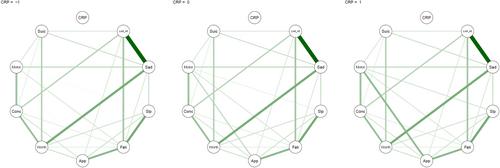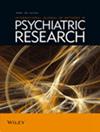Networks of C-reactive protein and depression symptoms in patients with stable coronary heart disease: Findings from the Heart and Soul Study
Abstract
Objective
Research addressing the associations between C-reactive protein (CRP) and depression among patients with stable coronary heart disease (CHD) has produced inconsistent results. This might be attributable to varying associations of CRP with specific depression symptom profiles. We responded to this challenge using various network analysis techniques.
Methods
A total of 967 outpatients with documented CHD were drawn from the baseline cross-sectional data of the Heart and Soul Study. We first estimated mixed graphical models that included CRP and individual depression symptoms, before and after adjusting for relevant covariates, to explore whether CRP is correlated with specific facets of depression. We also investigated whether CRP levels moderated the associations between specific depression symptoms using moderated network models. Finally, we performed a network comparison test and compared the symptom network properties between non-elevated and elevated CRP groups.
Results
In the network model without covariates, CRP was positively associated with fatigue, appetite changes, and psychomotor problems. CRP maintained its negative association with concentration difficulty regardless of covariate adjustment. Few symptom-symptom associations, especially those involving appetite changes, were moderated by CRP. Further, the elevated CRP group showed greater overall symptom connectivity as compared to the non-elevated group.
Conclusion
This study segues into CRP-depression relationship with sophisticated methodology.


 求助内容:
求助内容: 应助结果提醒方式:
应助结果提醒方式:


